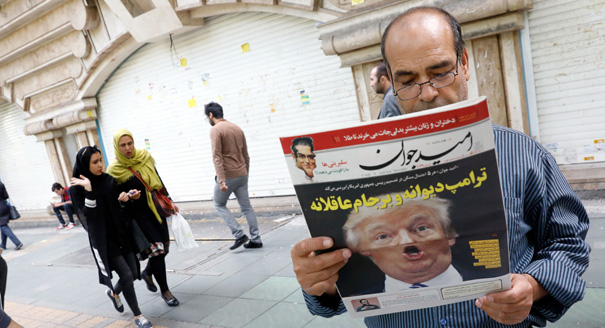“Strategy,” wrote Lawrence Freedman in his seminal book of the same name, is “about maintaining a balance between ends, ways, and means; about identifying objectives; and about the resources and methods available for meeting such objectives.”
The Trump administration’s new Iran strategy has articulated three ambitious objectives. First, improving upon the 2015 nuclear deal, known as the Joint Comprehensive Plan of Action or JCPOA. Second, countering malign Iranian influence in the Middle East. And third, supporting the Iranian people “to take back their government.”
While these objectives may be desirable, under President Donald Trump’s leadership none are attainable. History has shown that Iran relents when it faces international unity and is divided domestically. Trump has created the opposite dynamic, splintering international unity while unifying Tehran’s disparate political factions against a common threat. Instead of focusing on the many things that Iran does wrong—including repression at home and complicity in mass slaughter and displacement in Syria—Trump has instead chosen to censure Iran for the one thing it is widely perceived to be doing right—adhering to the nuclear deal. In the court of international public opinion this has served to isolate Washington more than Tehran.
Building a global coalition against Iran was much easier in 2012. The world’s great powers—namely the United States, Europe, China, and Russia—were united in wanting to avert both an Iranian nuclear weapon and an attack against Iran. Obama’s unreciprocated overtures to Tehran, coupled with the charlatanism of Iran’s then-president Mahmoud Ahmadinejad, helped convince the world that Iran was the problem, not America. The combination of punishing economic sanctions—including Europe’s embargo of Iranian oil—and the election in 2013 of Iran’s pragmatic president, Hassan Rouhani, created a propitious environment for diplomacy.
While neither Iran’s regional behavior nor its domestic behavior has improved since the nuclear deal was signed, reconstituting the same global resolve in reaction to Iran’s domestic and regional activities will prove impossible for Trump. For one, in contrast to Iran’s nuclear ambitions, there is no global consensus against Iran’s regional ambitions. Russia works in unison with Iran in Syria. Many European countries see Iran as a tactical ally against the Islamic State. And in a region plagued by failing states and civil war, Tehran appears in the eyes of many to be a stable regional power that should be engaged, not isolated.
Countries such as China were previously willing to forsake their commercial interests in Iran for they feared the skyrocketing oil prices that would follow a failure to reach a nuclear deal. That changed once the JCPOA was signed in July 2015. Today, Iran is a prominent chess piece in China’s One Belt, One Road initiative and Beijing is unlikely to abdicate its own economic interests simply to placate Trump.
Nor will China and Russia, both led by authoritarian regimes, be willing to support any U.S. efforts to help the Iranian people “take back their government.” Europe, once an outspoken advocate of human rights in Iran, has largely remained silent. Though Iran’s population had long been thought of as the most pro-American in the Middle East, Trump’s opposition to the nuclear deal, visa ban, and use of “Arabian Gulf” rather than “Persian Gulf” have alienated Iranians more than any U.S. president since 1979. Iranian Supreme Leader Ayatollah Ali Khamenei has said for three decades that America is arrogant and untrustworthy. Finally he feels vindicated.
Does European, Russian, and Chinese support really matter? As Trump recently told Fox news, “I told them [the EU]: ‘Just keep making money. Don’t worry about it. We don’t need you on [Iran].” Given that nearly 100 percent of Iranian trade is conducted with countries other than the U.S., however, Trump’s claim is specious. Unilateral U.S. pressure will not compel Iran to reassess its nuclear, regional, or domestic behavior if it believes commercial doors in Asia, Russia, and Europe will remain open.
Trump’s Iran strategy risks becoming the worst of both worlds: unencumbering Iran from its obligations to the nuclear deal while undermining the unified international pressure necessary to counter it. A wiser strategic approach for Trump would have been to go to U.S. partners and allies with the following message: “I don’t like the nuclear deal, but I will continue to adhere to it only if you work with us to thwart Iran’s problematic role in the Middle East, and its brutal treatment of its own population.”
How to effectively oppose Persian power similarly preoccupied the ancient Greeks. Thucydides, the legendary Athenian historian and a favorite of U.S. National Security Advisor H. R. McMaster, believed the greatest strategist of his day was Pericles. “The ability to persuade not only one’s people but also allies and enemies,” Lawrence Freedman wrote of Pericles, “was a vital attribute of the successful strategist. In this way, strategy required a combination of words and deeds, and the ability to manipulate them both.”
Trump’s greatest failure, both in his Iran policy and more broadly, has been his ability to alienate America’s closest allies, and make America’s greatest enemies appear more sympathetic.






